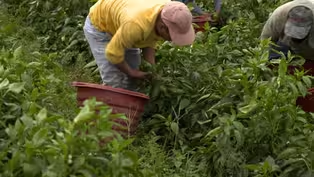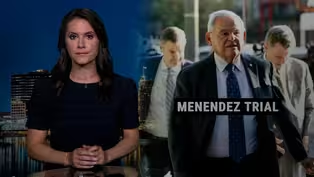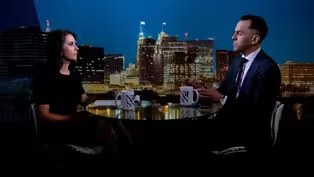NJ Spotlight News
Study: Transparent policing improves community trust
Clip: 6/11/2024 | 5m 40sVideo has Closed Captions
Interview: Nusret Sahin, assistant professor of criminal justice at Stockton University
A Stockton University conducted study looked at whether practices such as releasing body camera footage of police-citizen interactions, using a procedural justice script and providing motorists with evidence of why agencies conduct traffic stops at certain locations could impact how residents feel about their interactions with police.
Problems playing video? | Closed Captioning Feedback
Problems playing video? | Closed Captioning Feedback
NJ Spotlight News is a local public television program presented by THIRTEEN PBS
NJ Spotlight News
Study: Transparent policing improves community trust
Clip: 6/11/2024 | 5m 40sVideo has Closed Captions
A Stockton University conducted study looked at whether practices such as releasing body camera footage of police-citizen interactions, using a procedural justice script and providing motorists with evidence of why agencies conduct traffic stops at certain locations could impact how residents feel about their interactions with police.
Problems playing video? | Closed Captioning Feedback
How to Watch NJ Spotlight News
NJ Spotlight News is available to stream on pbs.org and the free PBS App, available on iPhone, Apple TV, Android TV, Android smartphones, Amazon Fire TV, Amazon Fire Tablet, Roku, Samsung Smart TV, and Vizio.
Providing Support for PBS.org
Learn Moreabout PBS online sponsorshipPolicing has come into focus in Atlantic City, specifically at Stockton University.
The school received a $700,000 grant from the U.S. Department of Justice to study how specific policing practices impact the community and their attitudes around law enforcement.
Things like releasing body camera footage or using a procedural justice script during stops.
Well, that study produced some interesting results.
I'm joined right now by the lead researcher, Nusret Sahin, who's an assistant professor of criminal justice at Stockton University.
Professor Sahin, thank you so much for being with us tonight.
I want to get a sense from you before we talk about the impact that these police practices had on the community.
I want to talk about how you conducted this study.
Can you just give us a sense of what that process was like?
Yes.
Thank you.
First, thanks for having me.
We we partnered with Atlantic City and Grove Police Departments and we did ride alongs with police officers and we trained officers on procedural justice and our protocol.
And they delivered our protocol during speeding stops.
And we asked people who were stopped by the police whether they would be willing to take in, take a survey, a short survey, and then after that, we analyzed our data.
That's how we conducted this study.
What is a procedural justice script?
What does that sound like?
Yeah, a procedure.
Just a script is a script developed by researchers scholars to enhance citizens perceptions of the police during traffic stops.
So it includes elements of dignity and respect.
And also, citizens are given a voice and they are given explanations for why the officers stop them.
This is a script developed by some other researchers, but we developed our own script by working with the officers in Atlantic City and Pleasantville.
And what can you tell me about the kind of training that was required to help officers understand what that script should sound like?
Also on the back end, things like releasing body camera footage.
How much did you have to work with the department on this?
Yes, Well, the implementation phase of this project was 20 months before we start the implementation phase.
We gave a two day training to the officers.
In the first day, they learned about the theoretical foundation of procedural justice and also police citizen interactions and also, you know, improving their interaction skills.
In the second day of the training, we focused on our protocol, which is mainly about, you know, what type of information they have to mention to the citizens when they interact with them.
And after developing this script, we also developed our website.
We have a website where we can track and monitor the videos, and also we get the approval from the police departments to release these videos.
The police supervisors have then an access, a login access to our website.
And you mean that all the body camera footage specifically?
Yes, Yes.
Yes.
The body cam.
Body cam footage?
Yes.
So what did you find?
What did you find in terms of the impact that these practices had on the community and residents, even as they were being stopped?
Yes.
First, we found that, like people who are working in the in this field knows that with the impact of the body cams are fading out, citizens are not no longer believe that they have an impact on Public Citizen interactions or they're making police professional, but by making footage available to them.
We have we have seen enhanced perceptions of body cams.
Now, the people who received our protocol thinks that the police is more professional because they're using body cams.
In addition to that, we have a higher level of trust to the police in our in the group that we see as our protocol, as well as they are more likely or they are willing to cooperate with the police on solving crime.
And also, you know, we have a higher level of cooperation in our experimental group.
So what does this tell you about moving forward?
Is this something that can be scaled across the state, across the nation?
Can it have a major impact?
Yes.
This may have a major impact because currently the police training includes directives on, you know, during traffic stops.
Officers shouldn't be engaging with citizens.
And our protocol is saying that if you engage with citizens and if you give them explanations, all the reasons for the stops and actually the police is doing this to keep the roadway safe as well as, you know, just making sure that the drivers are safe and also passengers are safe if they communicate that message, they are more satisfied.
And this increases their level of trust as well as of obligation and compliance, because, you know, we also expect that this may be escalate situations.
So we are hoping that, you know, this becomes a nationwide practice.
Excellent, excellent study, excellent research.
Thank you so much for coming on to share with us, Professor Nusret Sahin.
We appreciate your time today.
Thanks for having me.
Have a good day.
Thank you.
Criticism of more protections for workers during heat waves
Video has Closed Captions
Clip: 6/11/2024 | 4m 49s | Business and agriculture groups are among the opponents (4m 49s)
Defense hammers star witness in Menendez trial
Video has Closed Captions
Clip: 6/11/2024 | 5m 9s | Jose Uribe's testimony is expected to continue into a fourth day on Wednesday (5m 9s)
NJ House Dems urge DOJ to reject private detention centers
Video has Closed Captions
Clip: 6/11/2024 | 5m 13s | Interview: Congressman Rob Menendez (D-8th) (5m 13s)
Pallone: Investigate Big Oil for gas price collusion
Video has Closed Captions
Clip: 6/11/2024 | 4m 8s | NJ congressman calls for investigation into the companies' finances (4m 8s)
Providing Support for PBS.org
Learn Moreabout PBS online sponsorship
- News and Public Affairs

Top journalists deliver compelling original analysis of the hour's headlines.

- News and Public Affairs

FRONTLINE is investigative journalism that questions, explains and changes our world.












Support for PBS provided by:
NJ Spotlight News is a local public television program presented by THIRTEEN PBS



